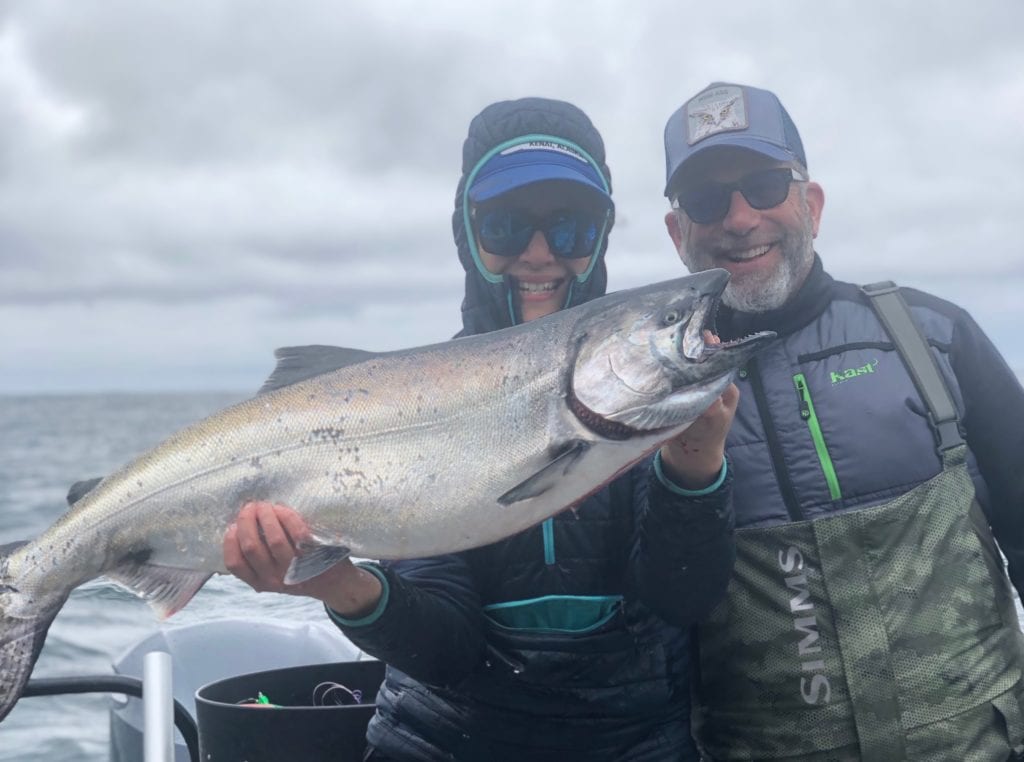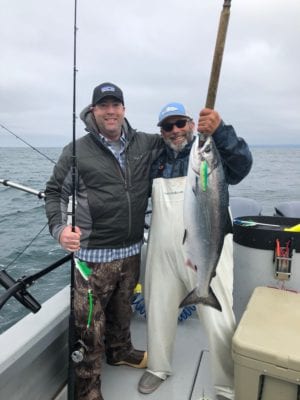
One day in early June, Seward charter fishing captain Andy Mezirow had four parties cancel their fishing trips because they didn’t want to comply with Alaska COVID-19 testing requirements for out-of-state travelers.
Then two more parties of four, all Alaska residents, signed up for the private charter aboard the Gray Light.
The custom-built Dr Radon 32-foot fiberglass game boat is designed for fishing parties of four setting out on private charters for some unforgettable fishing.
In a normal summer, Mezirow’s charter business would be booked for about 75 trips. Given concerns about COVID-19 and mandates the state has imposed of everyone coming into Alaska, many clients have cancelled.
Limiting clientele to parties of four who know each other meanwhile offers some healthy safety assurances, he said. “I think it is a better trip for the boat if they know each other. I don’t take split parties ever. It seems to be a built-in safety factor.”
Still passengers on the Gray Light, with Captain Tee Barnett at the helm, must get a temperature check before boarding and wear masks at least inside the cabin of the boat, where social distancing is more challenging. Barnett herself wears a mask at all times on the boat.
“She has two young children and doesn’t want to get it (COVID-19),” he said. “I don’t want to be responsible for getting an employee gravely ill, and I’d hate to feel I was the one who brought sickness to this community.”
Mezirow, who also serves on the North Pacific Fishery Management Council, does not captain the charters at this time because he is considered to be medically at high risk, but his boat is equipped with paper masks for clients, and all frequently touched surfaces get plenty of wipe downs with a solution approved by the Centers for Disease Control.
“I don’t think there’s any silver bullet,” he said. “All we can do is mitigate the risk to crew, captain and clients.”

Other fishing charter captains are taking different precautionary steps. One operator who used to take 30 clients, allowing 15 to fish at a time, now limits the number of people on his boat to 15, and even tour boats have greatly reduced their capacity, he said.
There are about 50 to 60 fishing guides in the Seward area and most of them will survive this year, he said, noting that for most of them it is a summer occupation.
Still, “most people are modifying their refund policies, trying to not spread the disease and still making a living,” Mezirow said.
His own boat is paid for, his house is paid for and his wife is a retired state employee, but he worries, he said, about younger folks with debt.
Extra costs of operation necessitated by the pandemic, including all the personal protective devices and sanitizing equipment, are somewhat balanced by the fact that fuel is about half the price now than it was a year ago.
Halibut charter operators also got a boost from a revision in halibut sport fishing regulations that now allow anglers on charter vessels to keep one fish of any size per day and one fish no more than 32 inches in length. Under prior rules a fish could be no more than 28 inches in length at the lower limit. The new federal rules for 2020 also removed the annual bag limit of four halibut and allow charter operators to stay open on Tuesdays and Wednesdays.
“We are used to losing tourists to the COVID requirements,” said Mezirow, “but we are also gaining Alaskans who like the increased bag limits and extra days of fishing.”
The charter fleet in Southeast Alaska, by comparison, relies entirely on tourists, and are seeing bigger economic challenges, he said.
Even with Alaskans signing up for charter vessel fishing in greater numbers, charter revenues in the Seward area are expected to be 40 percent to 50 percent lower overall this year, and the bed tax revenues for Seward are predicted to be reduced by 70 percent, he said.
All things considered though, it’s actually a pleasant summer, he said.
“We’re getting to spend more time with our families and do things like we used to do,” Mezirow said. “We are going to do the fun stuff this summer. We are trying to stay positive.”





